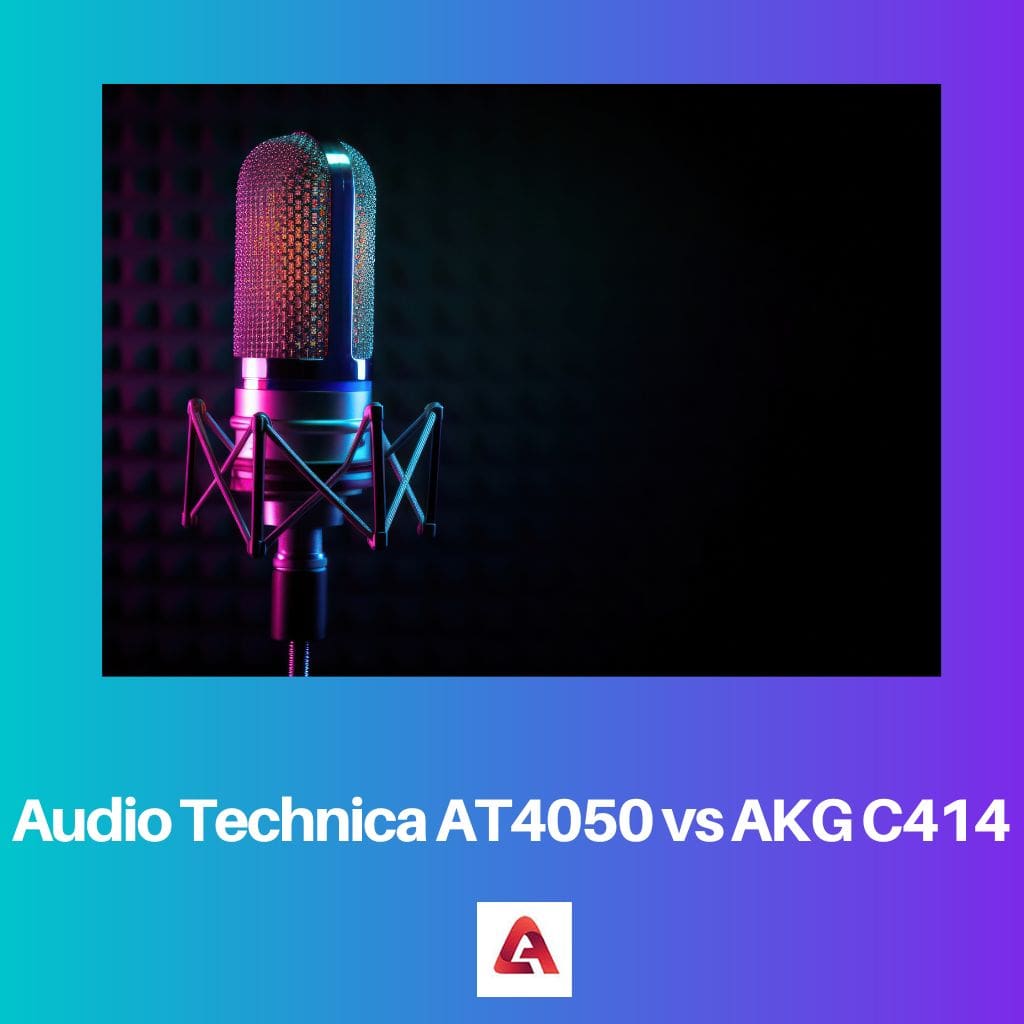In today’s market, many innovations and technologies have been built up and come into existence worldwide. Many tech-savvy companies have started to explore different requirements or needs of the consumer and, with effect to that, come up with different innovations.
One such is the microphones that help in recording different sounds and cancel out the background noises.
Key Takeaways
- The Audio-Technica AT4050 is a multi-pattern condenser microphone, while the AKG C414 is available in various models with different polar pattern options.
- The AT4050 is known for its natural and accurate sound reproduction, making it ideal for vocals and instruments in studio settings.
- The AKG C414 is a versatile and popular microphone with a rich history and proven performance across various recording applications.
Audio Technica AT4050 vs AKG C414
The difference between Audio Technica AT4050 and AKG C414 is that the model Audio Technica AT4050 was built with the primary purpose of studio recording only. It is a condenser with a frequency range of 20 Hz to 18 kHz. While comparatively, on the other hand, the model AKG C414 was built with a primary purpose of both live sound and studio recording.

Audio Technica AT4050 is a model with many vivid specifications that it is a type of condenser with three different directionality – Omnidirectional, Unidirectional, and Bidirectional. The model comes with a shock mount, hard case, and mic sock.
The average approximate weight of the model is quite heavy that is 0.51 kg, but the price is very affordable.
AKG C414 is a model built with the primary purpose of recording live sound and studio recording. The model is available in two different colors that are dark grey and silver.
The dimensions for the respective model are – length is 38 mm, width is 50 mm, while height is around 160 mm. The mic has three different decibel pads that are – 6 dB, 12 dB, and 18 dB.
Comparison Table
| Parameters of Comparison | Audio Technica AT4050 | AKG C414 |
|---|---|---|
| Primary Purpose | Studio recording only | For live sound and studio recording |
| Capsule | Electret condenser | Condenser |
| Pad | 10 dB | In three different decibel’s that is – 6 dB, 12 dB, and 18 dB |
| Range of Frequency | 20 Hz – 18 kHz | 20 Hz – 20 kHz |
| Impedance | 100 Ω | 200 Ω |
| Operating Voltage | 48 V | Ranges in between 44 V to 54 V |
| Color of the model | Black | Grey |
| Weight | Heavy | Light |
| Price | Cheap | Expensive |
What is Audio Technica AT4050?
It is a studio condenser, which records every detail. The large-diaphragm of Audio-Technica AT4050 features three switchable polar patterns and a remarkable combination of traits: high-SPL capability, transparent and airy uppers/mids, and rich low-end qualities.
Its two large diaphragms are gold-vaporized and seasoned for dependable performance. Some of the specifications provided by the company in the model Audio Technica AT4050 are given below –
- Connector Type – XLR
- Directionality – Bidirectional, Omnidirectional, Unidirectional
- Signal Type – Analog
- Diaphragm Size – Large Diaphragm
- Type -Condenser
- Use – Studio
- Connectivity – Wired
The features of the model Audio Technica AT4050 are –
- Advanced acoustic engineering and rich low-end and transparent uppers/mids characteristics come together to provide a wide range of performance options and the highest quality.
- The microphone’s dual-diaphragm capsule preserves excellent polar pattern delineation across the entire frequency range.
- The vapor-deposited gold diaphragms, which are 2-micron thick, go through a five-step aging process to ensure that the desired properties are maintained throughout time.
- Transformerless circuitry reduces low-frequency distortion and improves high-speed transient correlation.
- Surface-mount electronics that are state-of-the-art ensure that A-strict T’s consistency and reliability standards are met.
- Hi-pass filter with a switchable frequency of 80 Hz and a 10 dB pad
- Superior isolation is provided via a custom shock mount.
| # | Preview | Product | |
|---|---|---|---|
| 1 |

| Audio-Technica AT4050 Multi-Pattern Condenser Microphone | Check Price on Amazon |
| 2 |

| Audio-Technica AT4040 Cardioid Condenser Microphone | Check Price on Amazon |
What is AKG C414?
The most versatile microphone for vocals and instruments in the studio and on stage has been a legend since 1971. For the greatest audio capture in any setting, the C414 XLS multipattern condenser microphone features nine polar patterns to choose from.
Even the tiniest overload peaks can be noticed with a peak hold LED.
Given below are the specifications provided by the company in the model AKG C414 are –
- Connector Type – XLR
- Directionality – Bidirectional, Omnidirectional, Unidirectional
- Signal Type – Analog
- Size of the Diaphragm – Large Diaphragm
- Type – Condenser
- Use – Studio
- Connectivity – Wired
Some of the features related to the model AKG C414 are given below –
- To detect the shortest audio peaks, an overload warning with an audio peak hold LED is used.
- It aids in the development of detailed audio or acoustic instrument recordings by providing optimal linearity and neutral tone.
- There are nine different polar patterns to choose from, so you can get the perfect setting for each purpose.
- There are three different attenuation levels: 6dB, 12dB, and 18dB.
- Three distinct bass-cut filters are switchable, assisting in the reduction of background noises such as wind noise, proximity effect, or subsonic sound, among other things.
| # | Preview | Product | |
|---|---|---|---|
| 1 |

| AKG Pro Audio Condenser Microphone, XLR, Black, C414 (3059X00060) | Check Price on Amazon |
| 2 |
| AKG C414XLII (Multi-Patt Classic Vocal Mic) | Check Price on Amazon |
Main Differences Between Audio Technica AT4050 and AKG C414
- The primary purpose of designing the model Audio Technica AT4050 is for the studio recording only while comparatively, on the other hand, the primary purpose of designing the model AKG C414 is for both the live sound and studio recording.
- The capsule in-built in the model Audio Technica AT4050 is the electret condenser, while comparatively, on the other hand, the capsule in-built in the model AKG C414 is the condenser.
- The model Audio Technica AT4050 has a pad of 10 dB sound while comparatively, on the other hand, the model AKG C414 comes with three different pads of sound that is in – 6 dB, 12 dB, and 18 dB.
- The frequency range of the model Audio Technica AT4050 lies in 20 Hz to 18 kHz, while comparatively, on the other hand, the frequency range of the model AKG C414 lies in 20 Hz to 20 kHz.
- The impedance of the model Audio Technica AT4050 is around 100 Ω, while comparatively, on the other hand, the impedance of the model AKG C414 is around 200 Ω.
- The operating voltage required for the model Audio Technica AT4050 is around 48 V, while comparatively, on the other hand, the operating voltage required for the model AKG C414 is around 44 V – 54 V.
- The color variant of the model Audio Technica AT4050 is mainly available in black, while comparatively, on the other hand, the color of the model AKG C414 is mainly available in grey.
- The weight of the model Audio Technica AT4050 is quite heavy and is around 0.51 kg, while comparatively, on the other hand, the weight of the model AKG C414 is light, around 301 g only.
- The price for the model Audio Technica AT4050 is very affordable while comparatively, on the other hand, the price for the model AKG C414 is very high.




